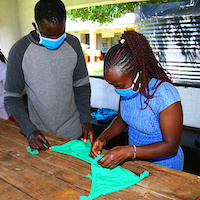International Women’s Day: progress needed — and progress made
Saturday is the beginning of the weekend: time for many of us to relax, meet friends, go shopping or even study, if we want to. We can choose. But for a significant proportion of the world’s population those choices don't exist. Millions of women throughout the world have little or no control over their lives. And that is not just a bad thing for them. It’s a bad thing for society as a whole. In 1975 the United Nations began celebrating 8 March — which this year is on a Saturday — as International Women’s Day. A lot of strides forward have been made since then — in promoting equality, education and inclusion for women, as well as in combating violence against women and improving the conditions in which they live. And yet, you might say, here we are in 2014 and an International Women’s Day is still necessary. Well don't forget that this is a celebration as much as a call for change. It’s a celebration not only of what women can do but also of what they are doing, as visitors to http://www.internationalwomensday.com and http://www.un.org/womenwatch/feature/iwd/ can find out. And we have learnt a lot in the past 40 years. Hence the theme of this year’s women’s day: Equality for women is progress for all. Why do we know that this is true? Well, here are a few statistics… Gender-equal access to agricultural resources could increase the average woman farmer’s crop yields by 20 to 30 per cent. In fact, if women farmers had the same access to tools and credit as men, there would be up to 150 million fewer hungry people. Improved education of girls alone was responsible for a 43 per cent total reduction in under-nutrition across 63 countries between 1971 and 1995. Women’s education also has a positive effect on a country’s GDP. And the sons and daughters of mothers who have had access to education are healthier, more likely to attend school and at lower risk of exploitation. Those figures come from The Hunger Project and Soroptimist International, just two of the many development groups focusing on International Women's Day this week and highlighting their own work to improve the lives of women. We at Friends of Londiani are also doing our bit, of course, notably through G4G. More precisely, during the week of the 17th of March international facilitators will work with Friends of Londiani Kenya to deliver Girls for Girls training courses. For those of you who don’t know about these courses, they tackle an all too common problem. Many girls in Kenya miss out on much of their schooling for a very simple reason: lack of access to affordable, hygienic sanitary products. G4G is helping to improve that access and ensure that fewer girls miss — or even leave — school. Since 2010 Friends of Londiani has worked with schools on the G4G Programme in Londiani and Kipkelion districts. To date 22 schools across both districts have joined the programme. Girls for Girls is proof that a modest change can have a far-reaching effect and that some of the solutions to an apparently difficult challenge — like ensuring education for all women — can very simple ones. We’ll tell you more about G4G, its successes and its challenges, in the coming week. In the meantime we hope this blog has inspired you to spend just a bit of the weekend finding out not only how much needs to be done to bring equality for women closer but also how much has been done. And, of course, to celebrate International Women’s Day.

